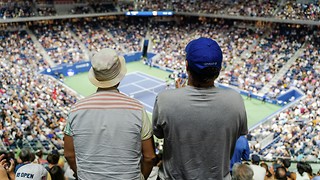Managers matter, and Man United’s decline proves it
Tom Wheeldon argues that Louis van Gaal would do well to learn from Manchester United’s living legend, Sir Alex Ferguson

Not so long ago, it was hard to imagine Manchester United being outclassed by Swansea and their manager responding by splashing out £36 million on an unproven teenager. Not so long ago the words 'civil war' and 'Manchester United' would never have featured in the same sentence. How times have changed.
Old Trafford, 5th March 2013. Sir Alex Ferguson’s side were a depleted force. With few world-class players to choose from for the Champions League quarter-final tie against Real Madrid – whose team sheet was glittering with galácticos – the United starting 11 was a mixture of mediocrities and has-beens. Admittedly they had Robin van Persie, one of the great striking talents of his generation. Yet the attacking midfielders there to supply him with chances didn’t come close to his level. The likes of Cleverley and Welbeck were and are competent players (Welbeck has a distinct talent for dispossessing opposition defenders – it’s just his ability to do anything productive with the ball once he wins it that is sorely lacking), but they have never had the capacity to become world-class. Meanwhile, the few greats in their side were mostly long past their prime – most notably Ryan Giggs, still showing extraordinary passing skills and ingenious tactical acumen, but at 39 missing the lacerating pace and power of his younger self. Centre-backs Ferdinand and Vidic had similarly declined in the speed and strength that had once made them so menacing.
Pitted against United that night was something not far off the platonic ideal of a Real Madrid side, a veritable galaxy of galácticos. Özil was an ever-dangerous creative presence in attacking midfield. Di Maria posed a lethal threat down their left wing. Higuain was primed with goalscoring prowess up front. Madrid even had a galáctico manager in José Mourinho. The jewel in their crown was Cristiano Ronaldo, once Ferguson's golden boy – and less a player than a machine, with an astounding array of impeccable skills.
But until Nani was sent off thanks to a refereeing error, their defence was impenetrable and Madrid’s attacks were pushing on a coiled spring that burst out in rapid counter-attacks. This team of mediocrities, has-beens and Van Persie had drawn 1-1 at the Bernabeu in the previous leg; with that away goal they only needed a 0-0 draw to vanquish Real Madrid and succeed to the quarter-finals. That this – or victory for United in this leg itself – looked almost certain to happen until the unjust dismissal of Nani was the ultimate testament to Ferguson’s gifts as a manager. Real Madrid were a much stronger team. They had a panoply of world-class players, unmatched as individual footballers by their United counterparts. Yet Ferguson managed to get a bravura performance out of a weak team. He did this consistently throughout the 2012-13 season – his last, and the last in which Manchester United won the Premiership.
The season after that, with David Moyes in charge for the overwhelming majority of games, United were achingly slow and it didn’t exactly take world class teams to outclass them – in the space of four days both Everton and Newcastle secured 1-0 victories at Old Trafford. They went from winning the league to coming seventh, despite the squad remaining largely the same. This demonstrates the colossal power of the manager in affecting outcomes in football. And United’s triumph in the Premiership the season before Moyes epitomised Ferguson’s extraordinary ability to have a transformative effect on his players.

This quality was the key factor in Manchester United’s dominance of English football throughout his reign. When Ferguson took over in November 1986, they were second from bottom of what was then the First Division. A culture of ill discipline and heavy drinking was rife. Instilling discipline on big characters in football is always extremely difficult – just look at United’s biggest rival, Liverpool, in the 1990s. For Liverpool the decade was defined by their abject failure to oust United from their hegemony at the top of the Premiership. They had many strong individual talents, in particular a group of English players given the derisive nickname ‘the Spice Boys’ – including Stan Collymore, Steve McManaman, Jamie Redknapp and Robbie Fowler. Despite their copious potential, lack of discipline on and off the pitch prevented them from winning anything during this period except for the 1995 League Cup. This was encapsulated in the ‘pass the pound’ game – as players passed a pound coin around throughout the game to decide who would be first to the bar afterwards.
Such antics would have been unimaginable at United under Ferguson the unwavering disciplinarian. His strictness was the key quality that transformed the sluggish, decrepit side of the mid-’80s into the powerhouse of the ’90s. He destroyed the hard drinking culture beloved by the likes of Bryan Robson – but with the understanding that if they did things the Ferguson way, United would rake in the silverware.
Yet his disciplined approach did not destroy team morale, nor did it unnecessarily alienate any players. One of the most frequently levelled criticisms against Ferguson is that he managed relationships with players poorly, leading to star players leaving and this having an evident negative impact on performance. Closer examination undermines this theory. Take the departure of United’s long-standing captain Roy Keane, with whom the Scotsman fell out in spectacular fashion in 2005. The dispute started in the summer of 2004 with a petty argument about the team’s accommodation on a pre-season trip to Portugal. Things escalated with a series of decidedly choice comments Keane made about other players on the club’s official TV channel MUTV. While some see proof of poor man-management, the truth is that Keane himself was dividing the squad, publically undermining his manager, and was visibly ageing. Dull and plodding, he was nothing like the titanic figure who had comprehensively neutralised Zidane and Inzhagi in the 1999 Champions league semi-finals.
Likewise David Beckham was moved on not because of the infamous ‘boot-kicked-at-his-head’ incident, but more because his playing style – run down the flanks and whip in the crosses – was outdated. The more fluid attacking formations of the last decade – ideal for Beckham's replacement Ronaldo and United’s understated star Paul Scholes – left no room for the global superstar. The death of the 4-4-2 was the death of Beckham. The fact that Madrid finished fourth in the season after signing him proves that Beckham’s loss was no great disaster. Ferguson let no player become bigger than the team, and prioritised unity above all else, always shielding his players in the media.
Louis van Gaal, by contrast, has an abominable record at managing the behaviour of star players, dominated as he is by his own ego. His tempestuous relationship with Rivaldo at Barcelona was just the most prominent example. The Brazilian was at the time the greatest footballer in the world, and chafed at van Gaal’s insistence that he play on the left of midfield. Rivaldo wanted a central attacking midfield role, a creative position just behind the strikers. As was proven after van Gaal was fired in June 2000, he was magnificent in his desired role – but, alas, while still Barca manager the Dutchman kept Rivaldo him on the bench for refusing to play on the left flank. At Bayern Munich in the late 2000s one of his main moves was to humiliate star striker Luca Toni –making him play for Bayern’s amateur team in the German third division while recovering from an Achilles tendon injury, for example. Evidently suffering from his injury, Toni was playing in front of just 2000 fans on an inadequately surfaced pitch. Suffice to say, his subsequent performances did not match his previous ones. Such poor player-manager rapports have also had their effect on Man United under van Gaal. For example, Angel di Maria’s sole season there was blighted by tension with the Dutchman. Consequently, the finest player signed (and signed for a whopping £59.7 million) for the post-Ferguson United underperformed and then left for PSG.

Ferguson, however, has always shown respect for his greatest players. In the 1990s he was happy to indulge Eric Cantona’s idiosyncrasies. Rightly so: Cantona was United’s talismanic figure of the ’90s, the centrifugal force in their often unstoppable attacking play. He was the best striker of his generation; the only United player under Ferguson’s tenure who came close to matching his favourite player Cristiano Ronaldo. As ever, Ferguson understood the need to favour the kind of players evidently marked to take their place in the pantheon of greats. Thus, in 2006, nearly a decade after Cantona’s early retirement, when Ruud van Nistelrooy fell out with Ronaldo, whom Ferguson described in his autobiography as the “most gifted” player he had ever managed, the talented Dutchman was sold to Real Madrid for £10.2 million. In this context, unlike van Gaal’s humiliation of Toni at Bayern, Ferguson’s sale of van Nistelrooy was necessary. There is a difference between being a top performer up front and being one of the greatest players in the history of the game. And that was the difference between Ruud van Nistelrooy and Cristiano Ronaldo.
In shaping play around his most ingenious attacking talents, Ferguson showed a stylistic approach at odds with that of van Gaal’s side. The underrated aspect of Ferguson’s United was its aesthetic quality: the distinctly un-English attacking midfield creativity of Paul Scholes, the marauding runs of Ryan Giggs down the left wing, the pyrotechnics of the wunderkind Ronaldo were all given free rein. In stark contrast, van Gaal’s approach is based on the continental possession-game approach – slowing down the pace of play and rolling the ball about incessantly across the midfield, patiently waiting for a moment of defensive weakness when a penetrating pass can release a striker for a short-range slot into the back of the net. There are big problems with this. The most worrying is that it places much reliance on luck, on moments of lackadaisical defending by the opponents to facilitate the breakthrough. As evinced by the 0-0 draw at home to an uninspiring Newcastle the other week, such moments don’t always come. Yet the most notable aspect of the van Gaal playing style is its aesthetic drabness. It is like an egregious parody of tiki taka. Watching the likes of Marouane Fellaini and Antonio Valencia glumly roll the ball about ad nauseum on a wet afternoon at the Hawthorns is about as entertaining as San Marino-Liechtenstein.
For all his talk of a football ‘philosophy’, van Gaal has brought no clever tactics or strategy to Old Trafford – unless you count that brilliantly inventive tactic ‘pay an exorbitant sum for Anthony Martial’. Tiki taka was supposedly the teleological finishing point in football tactics, the playing style to end all other playing styles – but in reality opponents can easily blow the possession game out of the water by aggressively pressuring at the root of its build-up, in midfield around the halfway line. By very definition a slow playing style is badly suited to the Premier League, with its heightened speed and physicality – as Ferguson’s former nemesis Arsène Wenger has discovered (although he chooses to wilfully ignore the ramifications of this discovery).

Ergo United would do well to increase the influence of van Gaal’s assistant Ryan Giggs. Manchester United’s performances during his brief spell as acting manager in 2014 showed precisely the Ferguson-esque qualities that can relight the fire of United’s trophy-winning glory. His first game in charge epitomised his managerial potential: United smashed four into the Norwich net. Admittedly, the East Anglian side have rarely posed a threat to the titans of the Premier League. But the most significant aspect of that game was the mood instilled by United’s playing style under Giggs. After the slow pace on the ball that was even worse under Moyes than it is under van Gaal, United were constantly surging forward with incisive passes and runs like lightning.
‘Ooh ah Cantona’, ‘Ryan Giggs running down the wing’, ‘He plays on the left / He plays on the right / That boy Ronaldo made England look shite’. These were the chants which once coruscated around the stands of Old Trafford. If van Gaal wants to replicate Ferguson’s unforgettable achievements at United, he would do well to develop talents like those three players and play them in the direct attacking style through which they and Manchester United flourished.
 Features / The community Cambridge accommodation creates (and doesn’t)9 August 2025
Features / The community Cambridge accommodation creates (and doesn’t)9 August 2025 News / Trinity sells O2 Arena lease for £90m12 August 2025
News / Trinity sells O2 Arena lease for £90m12 August 2025 Lifestyle / An ode to college accommodation11 August 2025
Lifestyle / An ode to college accommodation11 August 2025 Sport / ‘A full-time job with overtime’: should disparities change the way we approach Bumps?6 August 2025
Sport / ‘A full-time job with overtime’: should disparities change the way we approach Bumps?6 August 2025 Features / Incoming freshers and their hopes, fears and expectations for Cambridge 12 August 2025
Features / Incoming freshers and their hopes, fears and expectations for Cambridge 12 August 2025









